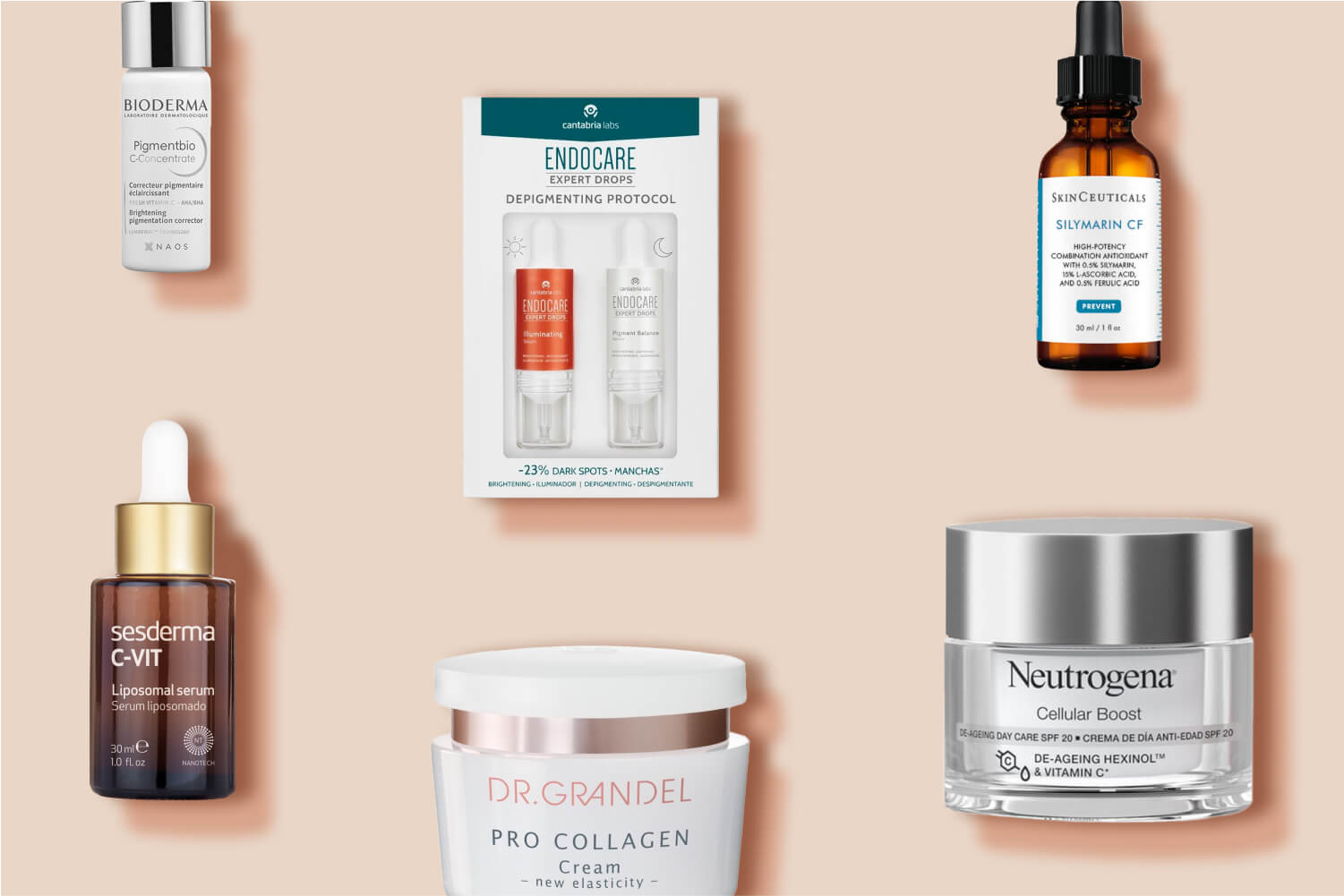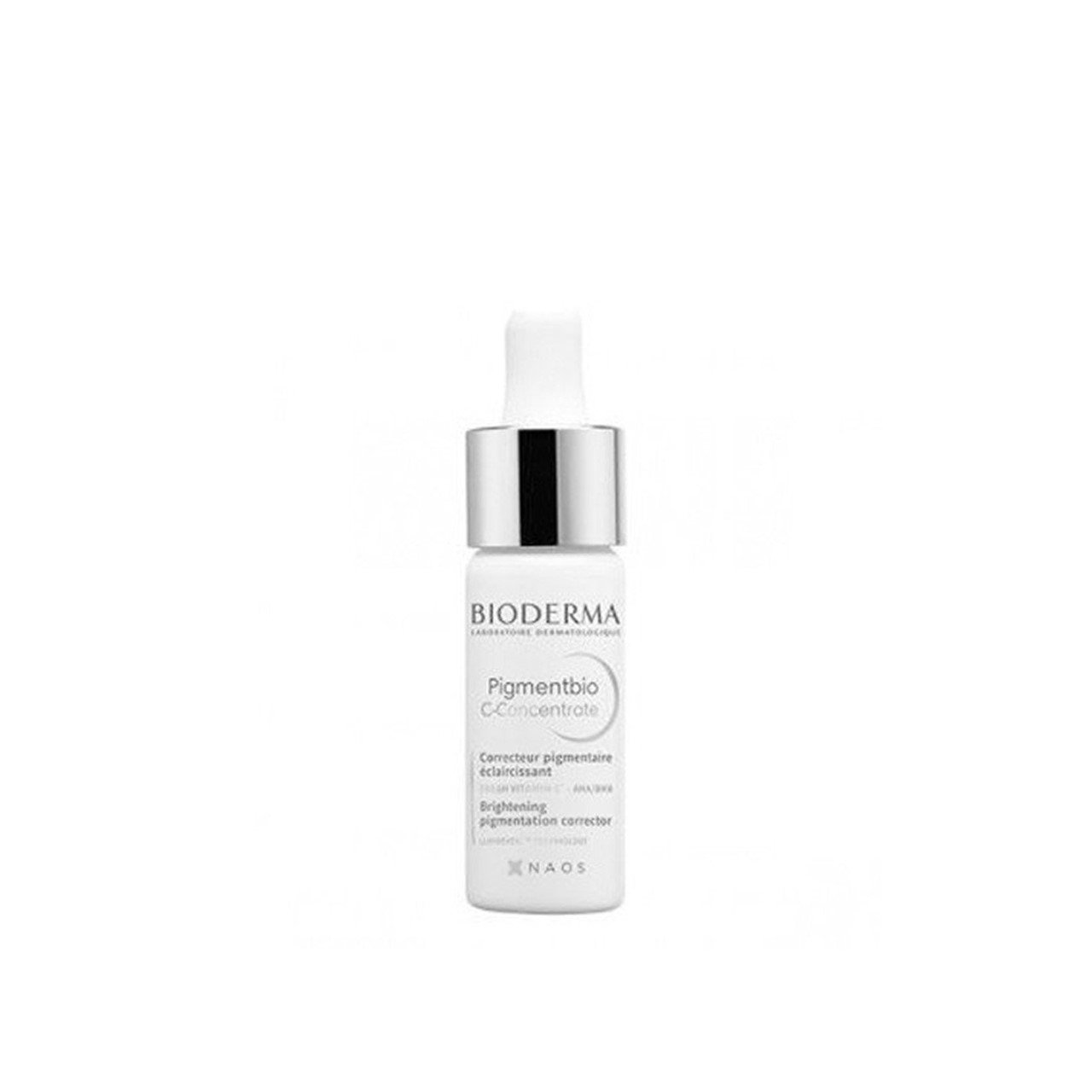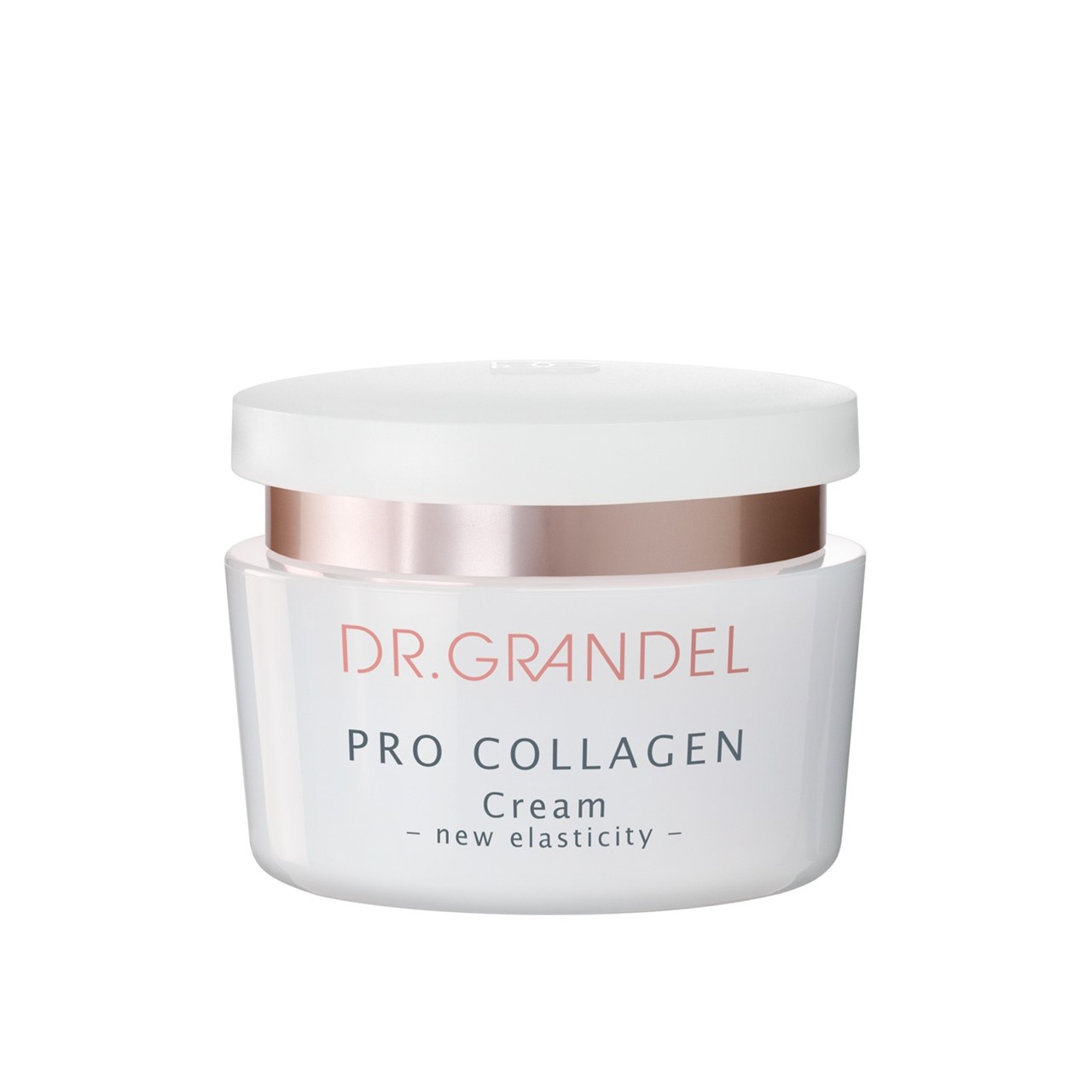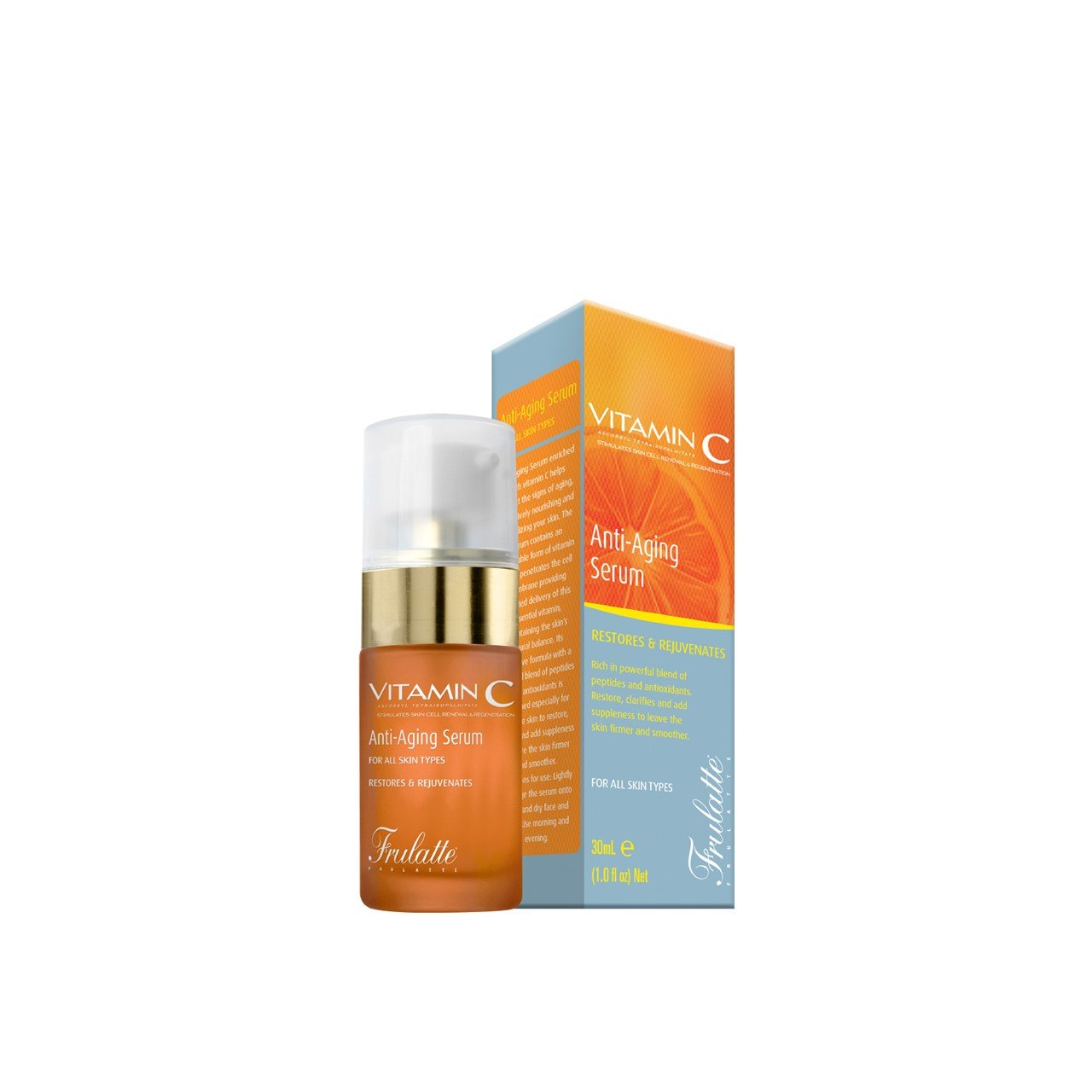
Vitamin C is one of the most popular skincare ingredients these days. However, hype aside, it’s important to know what vitamin C can actually do to benefit your skin–and when it’s best to opt for another key ingredient. Join us on this deep dive into the benefits, side effects, and how-tos of vitamin C skincare.
On this post:
- What is vitamin C?
- How vitamin C benefits the skin
- Potential side effects of vitamin C
- Who should use vitamin C?
- How to use vitamin C in your skincare routine
- What kind of products contain vitamin C?
What is vitamin C?
Everyone has heard of vitamin C, and for very good reasons. Vitamin C is a water-soluble vitamin that brings countless benefits to our body, and that includes our skin. Our body needs vitamin C for the maintenance of many biological processes, but it cannot produce vitamin C independently; therefore, the easiest way to bring vitamin C to our tissues is to eat vitamin C in a healthy diet and, of course, apply vitamin C directly to the skin with topical skincare products.
Overall, the benefits of vitamin C for the skin are threefold: it’s a powerful antioxidant, it brightens the skin, and it boosts collagen production. These are very valuable benefits, but they come with some cons.
You see, vitamin C is extremely unstable in skincare formulations. It oxidizes easily when it contact with light or air, and it will not hesitate to spoil your favorite serum by turning it yellow or brown. (This is why so many vitamin C serums come in colored, usually amber glass.) Vitamin C is also rather sensitizing. This should be a concern if you have sensitive skin, or if you are trying out a highly concentrated serum.
Types of vitamin C
Vitamin C can appear in your skincare products in many forms–and, therefore, with many names. One of the most common forms, ascorbic acid or L-ascorbic acid, is what many brands call “pure vitamin C”. A powerful antioxidant, ascorbic acid brings you plenty of benefits… along with all of the problems we’ve mentioned above. It oxidizes easily, and it’s rather sensitizing to the skin.
Because of these difficulties, the skincare industry is highly focused on developing vitamin C derivatives that are not only more stable and therefore easier to work with in skincare formulas, but also maintain the properties of pure vitamin C. (After all, what’s the advantage of creating stable ingredients that don’t bring any benefits?) There are several derivatives on the market right now, some of the most popular being ascorbyl glucoside (aka vitamin CG) or ethyl ascorbic acid. Other derivatives you may be able to find in the beauty aisles these days include:
- Aminopropyl ascorbyl phosphate
- Ascorbyl palmitate
- Magnesium ascorbyl phosphate
- Sodium ascorbyl phosphate
- Tetrahexyldecyl ascorbate
- & more!
A 2012 study looked at the properties of pure vitamin C (ascorbic acid) and many of these derivatives, with the goal of analyzing whether they a) were stable, b) were easily absorbed by the skin, c) could be converted to ascorbid acid in the skin, and d) maintained the antioxidant, brightening, and collagen-boosting benefits of vitamin C. Some forms of vitamin C fared better than others, but there’s still much to discover regarding the comparative effectiveness of one form versus another. Like with all things skincare, we recommend that you try them out, and see what works best for you!
Why freshly-activated “powder” vitamin C serums exist
Another way to work around the instability of vitamin C is to opt for freshly-activated vitamin C products, usually serums. These serums are usually presented in a bottle that contains the liquid serum at the bottom, and the vitamin C powder (which is much more stable) at the top, usually in the cap. To activate these serums, you must turn the cap in a specific way, after which the vitamin C powder will fall into the liquid serum. Shake it, and you’ll have your serum ready to use.
Some examples of this type of product include the Eucerin Hyaluron-Filler 3x Effect Vitamin C Booster or the ISDINCEUTICS Rejuvenate Flavo-C Forte Serum. These serums tend to be much smaller than a normal serum (usually around 10ml, much smaller than the 30ml of most serums) and have a relatively short viable period after opening. This ensures that the product remains stable throughout the entire time you are using it.
How vitamin C benefits the skin
We have already mentioned that vitamin C has three main benefits: it’s a powerful antioxidant, it brightens the skin, and it boosts collagen production. Let’s get to know each of these benefits in-depth.
It’s a powerful antioxidant
By now, you’re tired of hearing that vitamin C is a powerful antioxidant; but what is, in fact, an antioxidant? What does it mean for a skincare ingredient to be “antioxidant”?
In short, an antioxidant is a substance, or active, that helps prevent and reverse free radical damage, also sometimes known as oxidative stress (get it? that’s why they’re antioxidants). Free radicals are unstable molecules that form when the skin is exposed to external factors, like UV radiation or pollution. Although they are natural byproducts of chemical processes that occur in the skin, free radicals have the potential to cause damage to cells, proteins, and DNA as they roam free around the body.
The good news is that antioxidants can help prevent and reverse free radical damage, and vitamin C is a top-notch antioxidant.
It brightens the skin
Vitamin C is one of the most-recommended ingredients for dull, tired skin, since it can provide it with a much-welcome boost of brightness and radiance.
However, that’s not all that vitamin C can do for your complexion. In fact, vitamin C is also a valiant ingredient in the fight against dark spots, due to its ability to inhibit tyrosinase activity and, as a consequence, help prevent the formation of dark spots.
If that sounds confusing, let us explain: dark spots and hyperpigmentation on the skin are formed when the skin produces excess melanin. Tyrosinase is an enzyme, naturally present in the skin, that takes part in the process of melanin producion. By inhibiting the activity of tyrosinase, vitamin c helps prevent the production of melanin, which in turn prevents the formation of new dark spots.
Because of this property, you will often find vitamin C as part of many anti-dark spot skincare products. Keep in mind, however, that vitamin C on its own won’t do you much good in terms of correcting dark spots; in order to do that, you might want to look at ingredients like azelaic acid, tranexamic acid, or Thiamidol, among others.
It boosts collagen production
One of the most promising properties of vitamin C is that it promotes collagen production in the skin. As you know, collagen is essential for keeping the skin firm and preventing signs of aging, such as wrinkles and loss of definition and firmness. However, there is no point in giving the skin collagen–we have to promote its production, and that is something that vitamin C can do.
Studies suggest that concentrations above 5%, used for at least 3 months, can bring visible results in terms of wrinkle reduction. So don’t be surprised if you see vitamin C as part of the formula of one of your favorite anti-wrinkle creams.
Potential side effects of vitamin C
Vitamin C is well-tolerated by most people, but side effects can still occur, especially when using vitamin C in higher concentrations (say, from 10% onwards). We’re talking about side effects that can start with a tingling or burning sensation upon application, and can go all the way to redness, irritation, and various forms of discomfort. If that sounds like you, don’t panic just yet: you can always use lower concentrations of vitamin C, or opt for an alternative ingredient to vitamin C.
Vitamin C and sun exposure
It is perfectly safe to use skincare with vitamin C during sun exposure. In fact, it’s even recommended, as vitamin C works as a potent antioxidant and UV protection booster when combined with sunscreen.
This doesn’t mean that you should apply a vitamin C serum or cream and, immediately afterwards, throw yourself into several hours of sun exposure. Our recommendation, and the one that will allow you to take full advantage of the properties of vitamin C, is to apply your vitamin C serum or cream before your sunscreen. Then, you will have your skin protected from radiation by UV filters, and you will have a greater chance of preventing sun damage due to the antioxidant and UV-boosting effects of vitamin C.
Vitamin C and pregnancy
First things first: vitamin C is pregnancy-safe, and you can keep using it as part of your skincare routine while pregnant. Indeed, vitamin C is a great ingredient to integrate into your beauty routine during pregnancy. Due to its antioxidant and brightening properties, vitamin C can be a great addition to a preventive routine against the dark spots and hyperpigmentation that often develop during pregnancy.
Who should use vitamin C?
Vitamin C is a star ingredient in the skincare world, so you may be interested in using this ingredient in your routine. As we’ve already seen, vitamin C has a trio of interesting benefits that include antioxidant protection, a brightening effect, and a collagen-boosting effect. These benefits make vitamin C an ideal ingredient to integrate into routines for:
- “Tired” skin that needs a radiance boost
- Skin that is very exposed to environmental and solar aggressions
- The first signs of aging such as dullness or fine lines
- Preventing and correcting dark spots
- Fighting wrinkles and loss of firmness
How to use vitamin C in your skincare routine
If you’re going to introduce vitamin C into your skincare routine, the usual recommendations apply: start with a low concentration of vitamin C, patch test the product on a small area of skin, and use the product on alternating days until your skin has grown used to it. Timing-wise, you can use vitamin C both in the morning and evening; however, if you’re trying to reap the antioxidant benefits, using it in the morning under your sunscreen will bring you the best results. (We’ve said it before and we’ll say it again: the best antioxidant and anti-aging ingredients won’t go far without sunscreen. Wear your sunscreen!)
In terms of ingredient combinations, vitamin C is at its best antioxidant behavior when combined with ferulic acid and vitamin E. It is also a sure friend of depigmenting ingredients like azelaic acid, tranexamic acid, or Thiamidol. Finally, it also plays well with retinol in anti-aging routines, provided that you are careful and patient when introducing both ingredients into your routine.
What kind of products contain vitamin C?
Most people are using to see vitamin C in serum formats–usually in a dark, amber bottle to ensure light stability–, but you can also find it in cream formats. As for the benefits, you will often find vitamin C positioned according to the main benefits we’ve seen: antioxidant serums to prevent and correct the first signs of aging; anti-dark spot serums designed as part of a more comprehensive routine against hyperpigmentation; and, finally, pro-firmness formulas aimed at skin that’s starting to struggle with loss of density and firmness.
Vitamin C for antioxidant benefits
When it comes to vitamin C serums, these two are a favorite of the Care to Beauty community–and the skincare community at large. On the one hand, we have the iconic SkinCeuticals Prevent C E Ferulic, a serum that needs no introduction. Combining 15% vitamin C, 1% vitamin E, and 0.5% ferulic acid, this serum increases the skin’s antioxidant capacity by eight times. The lipid-replenishing texture is ideal for normal to dry skin.
Nearby is the Sesderma C-Vit Serum Liposomal, another star among our community. With stabilized vitamin C, tranexamic acid, and hyaluronic acid, this serum is a true do-it-all for anyone looking for a versatile care product that tackles radiance loss and skin aging on multiple fronts. The active ingredients are encapsulated in liposomes, a Sesderma specialty, to obtain deeper penetration and greater effectiveness. The formula works across skin types, which only adds to its versatility.
Vitamin C for brightening
If you’re looking for a vitamin C serum to integrate into your anti-dark spot routine, there are options on the market that take all the guesswork out of making your choice. Bioderma Pigmentbio C-Concentrate, for example, is a unifying and illuminating care that complements the Bioderma Pigmentbio anti-spot ritual. With vitamins C, E, and PP, this serum protects and strengthens the skin barrier, while helping to reduce the intensity and extent of dark spots. The light formula, almost like a gel-cream, absorbs quickly and is suitable for all skin types.
In an even simpler format, we have the Endocare Radiance C Ferulic Edafence Serum Gel, a serum designed for morning and evening application. It combines stabilized vitamin C with two Endocare-exclusive ingredients–EDAFENCE® and SCA®–to reinforce, protect, and repair the skin during and after exposure to daily aggressions. This powerful serum repairs and shields your skin to boost radiance, promoting a more uniform and luminous skin tone.
Vitamin C for wrinkles and firmness
Finally, let’s look at a couple of vitamin C products you can try if your priorities are wrinkles and loss of firmness. First we have the DR. GRANDEL Pro Collagen Cream, a restructuring cream that combines a firming Amino Silicium Complex with vitamin C, specifically in the form of ascorbyl palmitate. Through the collagen-boosting properties of these ingredients, this cream stimulates the skin’s collagen production, for skin that looks and feels firm, elastic, and smooth.
Arganicare answers to this concern with the Arganicare Frulatte Vitamin C Anti-Aging Serum, an anti-aging serum that promotes collagen and elastin synthesis through the combination of vitamin C with peptides, and hyaluronic acid. Here, vitamin C not only promotes firmness, but also helps to correct uneven skin tone and reduce dark spots.
Now that you know all about the benefits of vitamin C for your skin, you’re ready to integrate this star ingredient into your skincare routine. Whether you’re looking for a skincare product to restore radiance to your tired skin, or a collagen-boosting treatment to prevent wrinkles and loss of firmness, you’ll be well on your way to achieving your skin goals with vitamin C in your routine. And there’s plenty of other skincare ingredients to mix and match to achieve the routine that best suits your needs!
Beauty Writer & Editor








